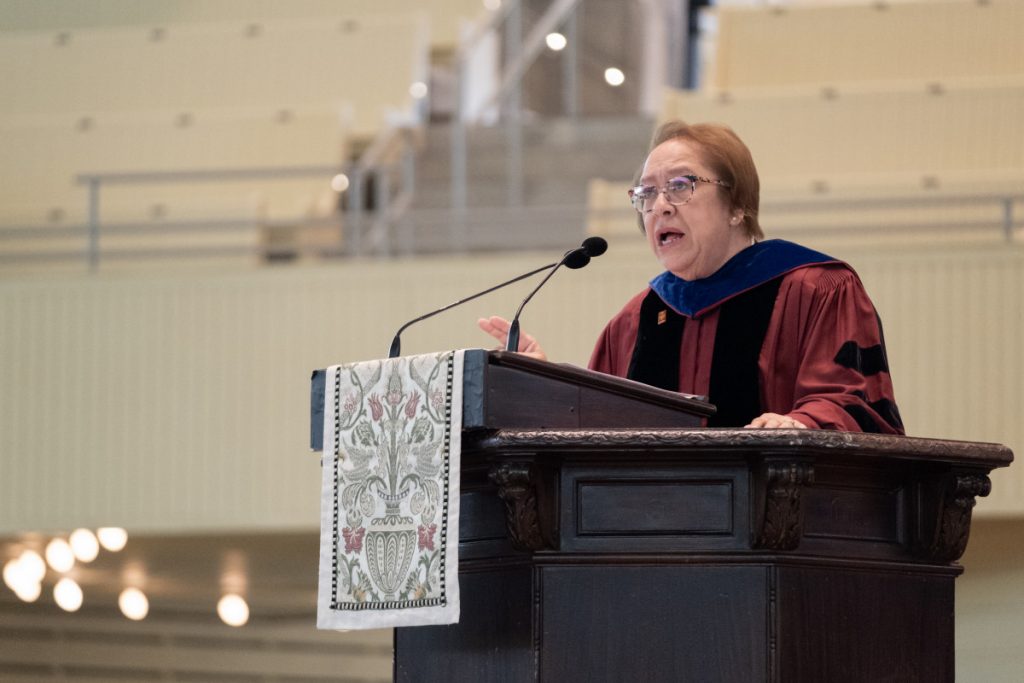
Column by Mary Lee Talbot
The book of Amos is one of the Rev. Daisy L. Machado’s favorites in the prophetic literature of the Hebrew scriptures. “Amos does not hear a still small voice like Elijah. His encounter with God opens with the roar. The Lord roars as a lion with power and anger about what is going on in a prosperous society,” she said.
Machado preached at the 9:15 a.m. Tuesday morning worship service in the Amphitheater. Her sermon title was “Looking Through God’s Corrective Lens,” and the scripture was Amos 6: 1,3-7.
Amos was called to convey God’s anger and dismay about life in the Northern Kingdom of Israel in the 8th century before Christ.
Machado said Amos described the complacency of the people with seven verbs: lie on beds of ivory, lounge on couches, eat lamb and calves, sing idle songs, improvise like David, drink wine and anoint themselves with oil.
“They did not grieve over the ruin of Joseph,” Machado said. “They were truly clueless about the world around them and hardened by self-gratification.”
She noted that archeologists have found 8th-century ivory carvings in Samaria that match the description in Amos. In the 10th century before Christ, in the capital city of Tirzah, the houses in the town were all of similar size. By the 8th century before Christ, there was a section of town with large houses “where the upper class enjoyed life and the rest of the town had small houses close together with the threat of slavery hanging over them if they did not pay their debts.”
In 2023, Oxfam, a global organization founded to alleviate poverty, found there were 1,253 millionaires who have more combined wealth than 4 billion people in the world, Machado said.
“After COVID, there are 700 million more people worldwide living on less than $2 per person, per day. People living in poverty rose over 40% after COVID, most of them Black and brown people, refugees and immigrants, women and children. There are 12.5 million children living in poverty in the United States,” Machado said.
She continued, “These are the realities in the United States but we are more engaged with superficial reality shows, Kim Kardashian and a consumerism that is all about ‘me’ and ‘my needs.’ In 2023, God is roaring like a lion. We need a prophetic word for today. We need a deep, long-lasting spirituality.”
William Sloan Coffin, former pastor of The Riverside Church in New York City and a 20th-century prophetic preacher, was an influence on Machado when she was in seminary and he offered a prophetic take on spirituality.
“He said that ‘Spirituality was living an ordinary life and living it exceptionally well,’ ” she said.
Coffin said there were three things needed to live this extraordinary life.
The first attitude was the need for wonder. “We have to live in awe of God’s goodness and mercy, to be in awe of creation as a gift and see the ‘imago dei’ in the face of the stranger,” Machado said.
The second attitude was anger. “When the rich do as they will and the poor suffer as they must, people become bitter. Coffin said it was better to get angry. If you have gotten used to having genocidal weapons around, will you get used to seeing a starving child?” she asked.
The third attitude Coffin said was needed for an extraordinary life was to make love — not faith — your aim, to work for justice for the poor and the children.
“The Lord God has spoken and it is not easy to prophecy when you lead a comfortable life,” Machado said. “We are called to ask questions that are not nice or comfortable.”
In Amos’ time, people flocked to worship and then went back to making money off the backs of the poor. Amos, in Chapter 5, tells the people of Israel that God does not want their festivals, solemn assemblies or burnt offerings. God said through Amos, “Let justice roll down like waters, and righteousness like an everflowing stream.”
Machado asked, “If we took the energy of our collective yearning, would it look like justice rolling down? How much change could we bring?”
She continued, “We have to live out our prophetic call. Let justice roll down like waters. We can make it possible. Let justice roll down like waters. We can stand up and be prophetic. Let justice roll down like waters. This is our collective living and preaching challenge to those who bring chaos. The Lion has roared. How will you respond?”
The Rev. J. Paul Womack, co-pastor of Hurlbut Memorial Community United Methodist Church, presided. Linda Thompson, a lay reader and Eucharistic minister in her home church, read the scripture. The prelude, played by organ scholar Nicholas Stigall was “Magnificat IV,” by Marcel Dupré. The anthem, sung by the Motet Choir, was “Tell Out, My Soul,” music by David Hurd and text, paraphrased from the Magnificat, or the Song of Mary, by Timothy Dudley-Smith. Joshua Stafford, director of sacred music and Jared Jacobsen Chair for the Organist, conducted the choir and Stigall accompanied the choir on the Massey Memorial Organ. The postlude was “Caprice,” by Louis-Nicolas Clérambault, played by Stigall. Support for this week’s chaplaincy and preaching is provided by the Gladys R. Brasted and Adair Brasted Gould Memorial Chaplaincy.




